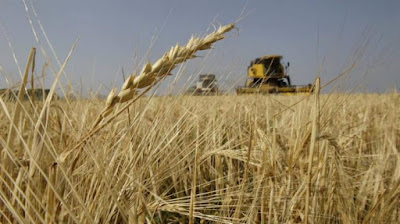Filenews 4 March 2022 - by Angelos Nikolaou
The upward trend in grain prices due to the war in Ukraine, continues steadily since 24 February, the day the Russian invasion began. Prices seem to have seen an increase of almost 35% yesterday. Grain supplies from Russia and Ukraine to the rest of the world, which together have 30% of wheat and barley, and 20% of corn, have been minimised, with the result that traders have turned to new markets.
During this week the price of chicken feed from €280 per ton soared to €375. Therefore, Cypriot merchants saw prices very inflated, so they proceeded to orders, but in smaller quantities than usual. Due to the uncertainty that prevails, with conflicts continuing, prices soaring and lack of liquidity, grain traders are no longer able to maintain stocks, and are turning to the state to meet this need.
Therefore, in the immediate future, the Cypriot Government will have to procure cereals in order to ensure sufficiency for the months when a problem may arise. In the role of a trader, the state will have to procure grain for one or two months, i.e. 25,000 up to 50,000 tons . The cereals are expected to be stored in the premises of the six traders and to be available to them at the replacement price, i.e. at the price to be purchased.
If the war is prolonged, the consequences will be very serious for Cyprus, which imports 90% of the feed and its only production is mainly barley with the harvest taking place in May.
Supply disruptions occur at a time when prices had already risen due to bad weather and supply chain problems, boosting inflation. Based on the latest orders of traders it is expected that by the end of the month 15-20,000 tonnes of maize will be available. The wheat of Romanian origin was bought from €378-€385 per tonne compared to €280-€290 the previous week. It is noted that a year ago the price of corn was €180 per ton. The price of soybeans, which is currently sold at €620 per tonne compared to €570 last week and €460 in the same period last year, is also soaring.
In recent days there have been repeated meetings in Cyprus on this issue. On Monday, a service meeting was held at the Ministry of Agriculture, followed on Tuesday by a meeting with the traders and on Wednesday the Advisory Committee met for the purposes of implementing the law on the Conservation of Stocks of Feed Materials and Cereals for Human Use. At the last session, PEK submitted a proposal for the purchase by the Government of the necessary quantities of cereals that cover the needs of the island for livestock or human use for two months. He even suggested that all the available storage areas that exist in the place be used, i.e. both the silos/warehouses of the merchants, as well as the silos of the Cyprus Cereals Committee.
According to information provided by "F", during today's meeting at the Presidential Palace, the Director General of the Ministry of Agriculture, Andreas Gregoriou, will present, following the instructions of the competent Minister who is absent at the United Nations Conference on the Environment, representing the President of the Republic of Cyprus, the situation and the data in the field of the adequacy of raw materials in Cyprus, after Russia's invasion of Ukraine. Mr. Gregoriou will also present all possible options for effective and trouble-free management of the situation. These options have been studied and worked on in the past few days in the Ministry of Agriculture and will be put before the President of the Republic today. On the basis of today's briefing and the decisions that will be taken, next Wednesday a proposal will be submitted to the Council of Ministers for immediate treatment of the situation.
According to all indications, the Ministry of Agriculture, taking into account that traders are unable due to liquidity to import to meet the needs over a longer period of time, will itself import rather from a Latin American country, store them in merchants' premises, and will be managed by importers.
Support for the agri-food sector due to the Ukrainian
Measures to address the negative impact on the agri-food sector due to the conflict in Ukraine were discussed with his European counterparts by Agriculture, Rural Development and Environment Minister Costas Kadis, at the extraordinary informal meeting of the EU's Council of Agriculture Ministers, which took place online on Wednesday 2 March.
The EU faces significant challenges immediately, as both Russia and Ukraine are leading exporters of cereals and oilseeds, with Ukraine being a major supplier to the EU for these goods, and should make efforts to increase the production of these goods, both for its member countries and for its partners.
The Minister called on the Commission to create a specific framework for the implementation of measures to support the affected sectors, while ensuring the adequacy of raw materials throughout the EU territory and especially in island member states facing more severe difficulties in the supply chain.
